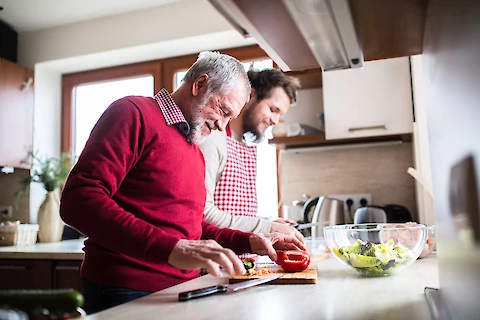
Cooking a meal together with your senior loved one at home can be a beautiful bonding moment. However, there are also specific food safety concerns to consider as you don your chef's hat. In fact, seniors are one of the highest-risk population groups when it comes to foodborne illnesses. Thankfully, a few food safety tips and strategies can help you whip up delicious, tasty meals in a way that's safe and healthy, and takes the appropriate precautions to protect your loved ones.
Why Food Safety is Important for Senior Citizens
Seniors ages 65 and older are at a higher risk for foodborne illnesses. According to the FDA, this is because their bodies can't tolerate certain types of bacteria as easily as when they were younger.
Seniors' immune systems may also be weaker or compromised due to medical conditions such as diabetes. This can leave them even more susceptible to bacteria in foods like undercooked eggs or deli meats. Finally, some seniors may take a variety of medications that suppress the body's natural infection-fighting ability — another contributing factor when it comes to food-related illness risks.
Symptoms of Food Poisoning
If you suspect that your senior loved one has consumed contaminated food, they may experience a variety of symptoms. These can range from nausea, cramps, and vomiting to diarrhea. In some cases, seniors may even have trouble breathing or experience heightened confusion if the infection is particularly severe. If you or your loved one experiences these symptoms, contact a medical professional immediately.
Foods to Avoid
Several types of food can pose an extra risk to seniors and should be avoided. Common culprits include unpasteurized dairy products, soft cheeses, raw or undercooked eggs, raw or undercooked meat, undercooked poultry, undercooked or raw fish (including sushi), deli meats, and meats that have been pre-packaged for long periods of time (such as refrigerated pates and meat spreads).
8 Food Safety Tips When Cooking for a Senior Citizen
1. Buy Cold or Frozen Food at the End of Your Grocery Trip
This is especially important when it comes to perishables like meat, fish, poultry, and dairy products. Wait to grab them until you've picked up everything else you need in the store. Grouping these items together in your shopping cart can help keep them fresh until you reach the checkout.
2. Check Fresh Produce for Bruising, Spoilage, and Mold
Not all fresh produce is safe for seniors to eat. Be sure to inspect fruits and vegetables closely, discarding any that are rotten, bruised, or covered in mold.
3. Follow "Best Before" Dates on Food Labels
Pay close attention to these dates, particularly with items like refrigerated products and items that you picked up from the ready-to-eat counter (e.g., sandwiches, wraps, salads, and rotisserie chicken). Never try to eat something that's past its expiration date — this could be dangerous for seniors in particular.
4. Immediately Refrigerate or Freeze Raw Meat, Seafood, and Poultry
Once you bring raw meat, poultry, and seafood home from the store, put them in the refrigerator or freezer within an hour. If your grocery trip involves multiple stops, store your groceries in an insulated bag with ice packs to keep them at a safe temperature.
5. Avoid Spreading Bacteria From Raw Food to Ready-to-Eat Food
Make sure to use separate cutting boards, dishes, and cooking utensils when preparing raw and ready-to-eat foods. It's also important to keep raw food on the bottom shelf of your fridge so that juices from them don't drip onto already-cooked food below.
6. Always Wash Your Hands Before and After Handling Food
One of the most important food safety tips is handwashing. In fact, this might feel like an overly obvious suggestion, but a commonly overlooked one, too! Wash your hands before and after you touch any food items and in between handling raw and cooked foods.
7. Regularly Clean Kitchen Surfaces, Dishes, and Utensils
Clean countertops, kitchen utensils, dishes, and surfaces regularly with mild soap and hot water after preparing any meals. This will help prevent the growth and spread of dangerous bacteria.
8. Cook Food to the Proper Internal Temperature
You must cook food properly in order to avoid foodborne illnesses. The USDA recommends that all poultry and ground meat should be cooked until it reaches an internal temperature of 165 degrees Fahrenheit. Roasts and steaks are considered safe once they reach a minimum of 145 degrees Fahrenheit. Investing in a digital thermometer can help you ensure that the right temperature is reached before serving each dish to your family.
Senior Helpers of Southwest Pittsburgh Offers Personalized In-Home Care
Senior Helpers of Southwest Pittsburgh's in-home care offers personalized services tailored to your loved one's specific needs, including help with grocery shopping and meal preparation. We can help care for seniors with the support of our licensed and trained professional caregivers who specialize in a variety of areas.
Contact us today to learn more about how we can help seniors throughout Pittsburgh, Bethel Park, Bridgeville, Allegheny County, and Washington County, PA.